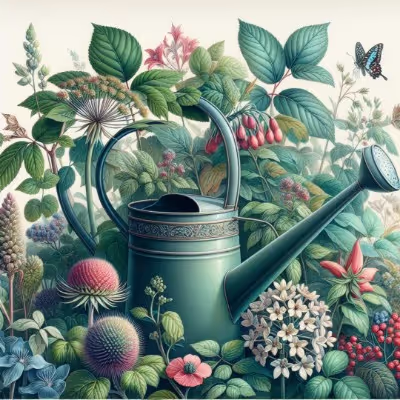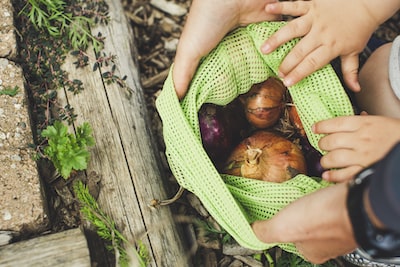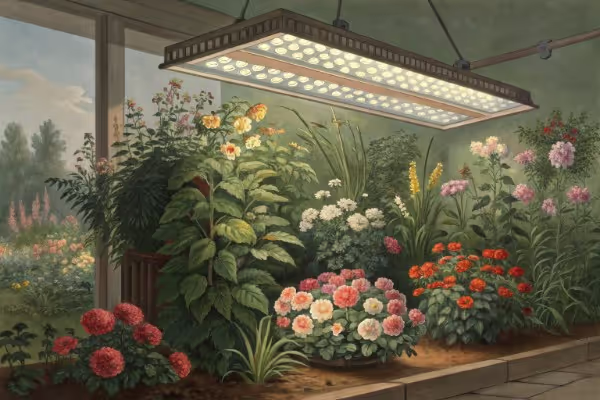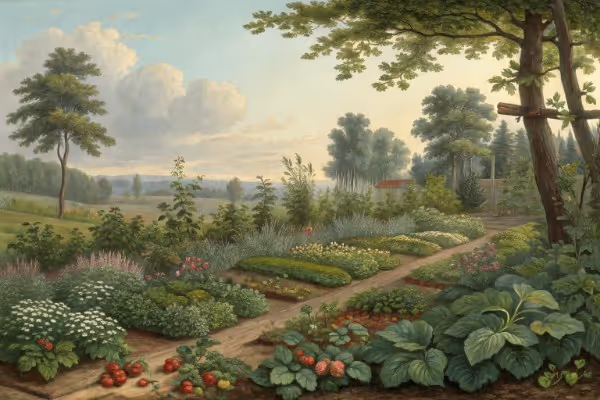Biodynamic Gardening: A Holistic Approach for Healthy Gardens

Biodynamic Gardening
Biodynamic gardening breathes life into your soil, syncing plants with nature's rhythms for healthy, vibrant growth. Born from Rudolf Steiner's holistic methods, biodynamic gardening balances compost, lunar cycles, and biodiversity to fortify your garden naturally. Ready to cultivate a garden that nourishes you and the earth? Grab a cup, settle in, and discover how to grow differently.
Cheatsheet: Biodynamic Success for Vibrant Gardens
🌱 Principles
- Treat garden as a single, self-sustaining organism
- Sync tasks to lunar & planetary rhythms
- Feed soil first, not just plants
- Use herbal and mineral compost preparations
🗓 Follow the Biodynamic Calendar
- Plant root crops on earth days, leafy greens on water days, flowers on air days, fruit on fire days
- Best sowing: waxing moon; best pruning: waning moon
- Studies: 12–20% higher nutrient levels in lunar-synced harvests
🔁 Compost & Preparations
- Add biodynamic preps (502-507) to compost (yarrow, chamomile, nettle, oak bark, dandelion, valerian)
- Use 500 (horn manure): Mix 1 tsp in 3 gal/12 L warm rainwater; stir 1 hour; spray on soil at dusk in spring/fall
- Apply 501 (horn silica): Mix 1/2 tsp in 3 gal/12 L; spray on leaves at dawn for improved photosynthesis
🦋 Foster Biodiversity
- Rotate crops yearly to reduce disease & pest risk
- Plant hedges, wild strips for pollinators & beneficials
- 80% fewer pests in mixed beds (Biodynamic Assn. data)
🍅 Health & Nutrition
- Produce richer in phytonutrients, minerals (up to 30% more calcium & magnesium)
- Reduces grocery dependence; supports self-sufficiency
- Improves soil carbon, boosting resilience & flavor
🛠 Tools and products you'll need
- Compost bin or pile
- Stirring stick or flow form
- Fine spray backpack or pump sprayer
- Certified biodynamic preparations (500–507)
- Biodynamic calendar
- Hand tools for cultivation
- Rain barrel or access to clean water
Understanding Biodynamic Gardening: More Than Moonlight and Magic
When I first heard about biodynamic gardening, visions of mystics burying cow horns under moonlit skies filled my skeptical mind. And honestly, there's some of that going on—but bear with me.
Biodynamics, pioneered by Rudolf Steiner in 1924, marries organic gardening with celestial cycles, subtle energies, and holistic land management practices. After years of experimenting in my garden, I've come to appreciate its rhythm and unexpected wisdom.
Principles Behind the Practice
The Cosmic Connection
Gardening by the lunar calendar sounded like hocus-pocus at first. Yet, planting carrots during moon's descending phases or leafy greens as it ascends noticeably improved vigor and yield in my patch.
Reflecting celestial rhythms in your planting calendar follows nature's lead—something our ancestors practiced intuitively.
Soil As a Living Entity
The foundation in biodynamics is treating soil as alive and vibrant. Compost preparations become potent elixirs—compounds infused with yarrow, chamomile, nettle, oak bark, dandelion, and valerian.
Months after adding biodynamic compost to my beds, earthworms multiplied, microbial life blossomed, and soil structure visibly improved.
"Healthy soil teems with billions of organisms per teaspoon—living symphonies beneath our feet."
The Animal-Garden Connection
Biodynamic methods encourage integrated garden environments. Chickens roam freely in mine, scratching soil, eating pests, and fertilizing naturally.
Incorporating animals not only boosts fertility—it creates a harmonious mini-ecosystem mirroring nature's balance.
Implementing Biodynamics in Your Garden
If biodynamics piques your curiosity, these practical steps can help you start:
- Try Lunar Gardening: Test planting, pruning, or harvesting according to lunar cycles. Observe your garden's response—I've found significant improvements in flavor, vigor, and shelf life.
- Create Biodynamic Compost: Blend plant-based preparations into compost piles. After applying biodynamic compost, plant resilience in my garden multiplied dramatically.
- Encourage Biodiversity: Cultivate diverse species, avoid monocultures, and invite beneficial insects. When I added pollinator-friendly flowers alongside veggies, yields soared, and pest problems plummeted.
- Integrate Livestock (if feasible): Chickens, ducks, or goats contribute greatly to garden vitality. If space allows, their presence noticeably boosted soil fertility and pest control for me.
Biodynamics vs. Organic Gardening: What's the Difference?
Organic gardening avoids synthetic chemicals, focusing on natural methods. Biodynamics takes this further, incorporating cosmic rhythms, animal integration, and specialized preparations.
It's like comparing good coffee to great espresso—both excellent, with biodynamics adding complexity and depth.
Does Biodynamic Gardening Really Work?
Skeptics abound, questioning biodynamics' scientific validity. True, peer-reviewed studies remain scarce; yet, personal experiences convince me otherwise.
After adopting biodynamic practices, produce tasted richer, pests decreased, and plants thrived noticeably better.
"Science may lag behind biodynamics' methods, but your garden won't."
A Holistic Approach Worth Trying
Admittedly, burying cow horns stuffed with manure feels strange initially—I felt ridiculous myself. But spending seasons observing, tasting, and harvesting convinced me of its subtle yet profound effectiveness.
Biodynamic gardening offers a gentle rebellion against industrial agriculture—realigning us with natural cycles and ancient wisdom. Give it a try; your garden may reward you richly.
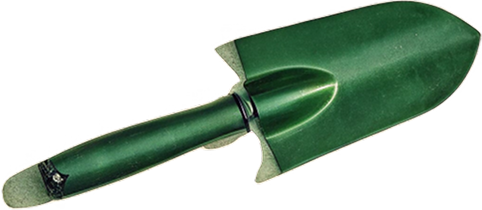
Want smarter plant choices? 🪴
Frequently Asked Questions About Biodynamic Gardening
How does biodynamic gardening differ from organic gardening?
While both biodynamic gardening and organic gardening eliminate synthetic chemicals, biodynamic approaches take an integrated view, considering lunar cycles, planetary movements, and holistic soil enrichment practices. Organic gardening primarily addresses soil fertility and pest control naturally, whereas biodynamics incorporates cosmic rhythms and specialized preparations to boost plant vitality.
What role does lunar planting play in a biodynamic garden?
Lunar planting utilizes the moon's phases to time gardening activities, promoting optimal growth. Planting leafy vegetables during waxing phases encourages foliage development, while root crops benefit from planting during waning phases. This alignment with lunar cycles leverages natural rhythms to encourage vigorous plant growth and health.
Are there specific preparations required for biodynamic gardening?
Yes, biodynamic gardeners use specialized homeopathic-style preparations labeled 500 to 508. These natural formulas, derived from herbs, minerals, and composted animal manures, enrich compost, enhance soil microbiology, and fortify plants against diseases. Applying these preparations according to seasonal and planetary calendars increases soil fertility and plant resilience.
Can biodynamic gardening methods be applied to container gardening or urban spaces?
Absolutely. Biodynamic principles adapt effectively to container gardening and urban gardening scenarios. Select appropriate containers, maintain high-quality compost enriched with biodynamic preparations, and follow lunar planting calendars for sowing seeds and transplanting seedlings. Even small urban spaces benefit greatly from biodynamic methods, resulting in vibrant plants and improved produce quality.
How can pest management be handled effectively in biodynamic gardening?
Biodynamic pest management emphasizes creating balanced ecosystems, utilizing plant diversity, companion planting, and beneficial insects rather than chemical interventions. Integrating flowering plants that attract beneficial insects and applying biodynamic preparations build naturally resilient gardens. Regular observation and timely interventions foster healthy ecosystems that naturally suppress pests.
What types of compost work best in biodynamic gardening?
Compost enhanced with biodynamic preparations delivers optimal results. These composts include organic plant material, animal manure, and mineral amendments, transformed through specific biodynamic preparations designed to stimulate microbial activity. Regularly applying biodynamic compost greatly improves soil structure, fertility, and moisture retention.
Does climate affect the implementation of biodynamic gardening practices?
Yes, climate influences the timing and adaptation of biodynamic practices. Gardeners in colder regions adjust planting schedules to accommodate shorter growing seasons, while warmer climates prioritize soil moisture management and heat-resistant plant selections. Regardless of climate, biodynamic calendars and preparations remain effective; gardeners simply adjust their timing and specific practices accordingly.
How soon can gardeners expect results after implementing biodynamic techniques?
Gardeners typically observe initial improvements within a single season, particularly regarding plant health and soil vitality. However, the broader transformations, such as increased biodiversity and improved long-term soil fertility, usually become more evident after one full growing cycle or about one year. Consistent practice over multiple seasons yields greater cumulative benefits to plants and soil alike.
Biodynamic Gardening doesn’t chase quick fixes—it honors the rhythms of nature, the invisible threads that tie soil, plant, and gardener together. By tuning into natural cycles, using composts and teas, and trusting cosmic cues, you build more than just healthy soil; you create a living system that gives back season after season. The results? Vibrant produce, resilient plants, and a sense of connection you won’t find in a bag of synthetic fertilizer. If you’re serious about growing food that’s alive and honest, or want to tackle weeds with respect for the earth, biodynamics offers tools—and a mindset—that stick with you. It’s slow, sometimes messy, but deeply rewarding work. Trust the process, respect your patch, and let nature’s wisdom take the lead.
Biodynamic Gardening and Your Health: Surprising Wellness Benefits
Increased Nutritional Density in Crops
Biodynamic produce shows up to 14% higher antioxidant activity compared to conventional crops (Journal of Agricultural and Food Chemistry). Enhanced antioxidants support immune function and heart health.
- Tomatoes: Increased lycopene content aiding cardiovascular health.
- Leafy greens: Higher iron and magnesium levels improving energy and cellular function.
Reduced Exposure to Toxic Chemicals
USDA tests revealed conventional vegetables contain pesticide residues in nearly 70% of samples; biodynamic gardening eliminates chemical synthetics, promoting safer, cleaner produce.
Natural Stress Reduction
Gardening activities lower cortisol levels and blood pressure, enhancing mental clarity. Biodynamic methods heighten connection to lunar and rhythmic cycles, further balancing emotional wellbeing.
Improved Soil Health, Enhanced Gut Health
Diverse biodynamic soil microbiota transfers beneficial probiotics into harvested foods, positively influencing human gut microbiome diversity and digestion.
Physical Activity and Vitality
Regular gardening burns approximately 300 calories per hour, improving muscle flexibility and cardiovascular fitness, while sunlight exposure increases vitamin D synthesis, supporting bone strength and immune resilience.
Find out which plants will thrive in your garden!
Answer a few fun questions and get custom plant recommendations perfect for your space. Let’s grow something amazing together!

start your season

